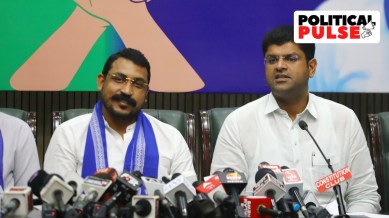JJP ties up with Bhim Army as all parties eye the formidable Dalit vote in Haryana
Dalits make up 21% of Haryana population. Announcing alliance with Chandrashekhar Azad, Dushyant talks of Devi Lal-Kanshi Ram ‘links’

WITH ALL the main political parties in Haryana trying to woo the Dalit vote bank in the state, which stands at a substantial 21% of the population, the Jannayak Janata Party (JJP) Tuesday unveiled an alliance with Chandrashekhar Azad’s Azad Samaj Party (Kanshi Ram).
It will be the first political foray of Azad, the Bhim Army leader, into Haryana, but comes in the wake of his win from the Nagina Lok Sabha seat, boosting his stature within the Dalit community.
Dushyant harked back to his great-grandfather Devi Lal, saying: “When Chaudhary Kanshi Ram staged a massive protest at Boat Club (in Delhi), Chaudhary Devi Lal was the first one to come and support him. At the time, Kanshi Ram demanded that B R Ambedkar be honoured with Bharat Ratna. When Devi Lal became Deputy Prime Minister, B R Ambedkar was not only honoured with Bharat Ratna but his statue was also put up at Parliament.”
The JJP chief said both leaders had taken several steps for the welfare of the community. “When Chaudhary Devi Lal became Haryana Chief Minister, he created SC choupals. Today, entire Haryana has these SC choupals,” Dushyant said, adding that in government, he too took steps such as re-development of these choupals.
The JJP, which won 10 seats in its poll debut in the 2019 Assembly elections, had emerged as a kingmaker in the hung House that followed. Its support to the BJP allowed the latter to form the government, and got Dushyant the deputy chief ministership. However, since parting ways with the BJP earlier this year, the JJP has been on the decline.
Seven of the JJP’s 10 MLAs have quit the party, with one joining the Congress, and two expected to go with the BJP. In recent days, Dushyant had made overtures to the Congress.
The JJP-ASP alliance has its eye on the potentially formidable caste combination of the JJP’s Jat support base and the ASP’s expected Dalit backing. The Jats make up 26% of Haryana’s population. In the 2019 Assembly elections, four of the seats won by the JJP were SC-reserved constituencies.
Earlier, the Abhay Chautala-led Indian National Lok Dal (INLD) – the original party from which Dushyant broke away to form the JJP – and Mayawati-led BSP announced that they would revive a previous tie-up for the Vidhan Sabha polls.
However, the Dalits in Haryana are not known to vote as a homogenous group, dissipating their influence. The BSP, for example, has not been able to make a mark in the state despite contesting elections here since 1998, which was the only time it won an electoral contest in Haryana. That time its candidate Aman Kumar Nagra won from the Ambala Lok Sabha seat.
In 1998, the BSP had an alliance with the Haryana Lok Dal Rashtriya (which later became the INLD).
In 2009, the BSP forged an alliance with then Haryana Janhit Congress, led by Kuldeep Bishnoi. It ended when the BSP walked out two-and-a-half months later.
Ahead of the 2019 Lok Sabha polls, the Congress held talks with the BSP for an alliance. After it did not materialise, the BSP tied up with the INLD, but broke it off just before the elections. Its new partner was the Loktantra Suraksha Party. The two parties got around 6% of the votes in all, with the BSP securing 3.6%.
But after the Lok Sabha polls, the BSP ditched the Loktantra Suraksha Party and moved towards the JJP – despite the latter being a partner of the BJP in the state. Their alliance, sealed in August 2019, lasted barely 26 days.
The SC-reserved seats in Haryana have been won mostly by the Congress and BJP. In the 2019 Assembly polls, the BJP won five of the 17 SC seats in Haryana, and the Congress seven, with the JJP winning four and one seat going to an Independent.
In the recent Lok Sabha polls, the apprehension among Dalits that a full-majority BJP government might change the Constitution’s provisions regarding reservations was one of the main reasons the party lost both the reserved seats in Haryana, which were won by the Congress – Ambala and Sirsa.
The BJP is also facing the anger of Jats and farmers in the state, besides resentment over the Agnipath scheme and wrestlers’ protest, making consolidation of the Dalit vote bank a potential game changer.